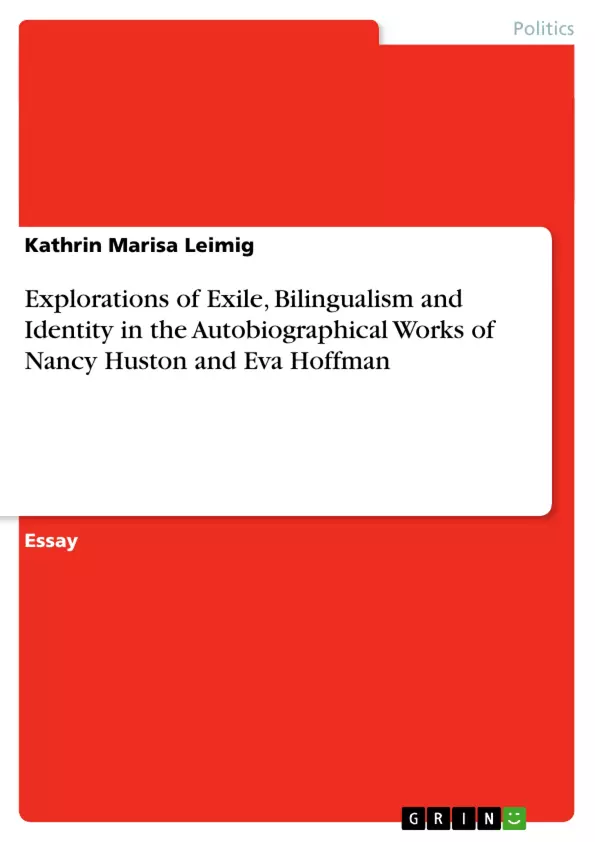The postmodern notions of exile and displacement are contested among scholars as their applications constantly undergo further transformation and modification. Especially the effects of globalization, including economic mass migration and other transnational population movements, have contributed to add a multiplicity of variations to their original denotation. Whilst in Greco-Roman Antiquity exile was coined as label for an individual banishment from a centre of civilization, in a postmodern context it refers to both a voluntary or involuntary human condition. Yet, beyond doubt, one must clearly distinguish between the different exilic experiences of various groups such as refugees, expatriates, émigrés, emigrants and so on because they differ in modalities and circumstances: it is obvious that enforced political displacement under harsh conditions and to an undesired place has a much more traumatic impact on self-identity than, for example, a planned migration for economic reasons. Yet exile was never a unitary category as it can refer to specific social and political conditions. Even though it is often used as an umbrella term, the motivations or direct causes to leave one’s country of origin can be as manifold as the various exilic realities in the host countries. Still, what all exiles have in common is the fact that they leave behind their home country in exchange for a life abroad. Nevertheless, in this context there are two questions that are crucial: has the exile chosen to leave or was s/he forced to do so? And is s/he part of a safety net or does s/he come to the host country unprotected?
Inhaltsverzeichnis (Table of Contents)
- Introduction
- Exile
Zielsetzung und Themenschwerpunkte (Objectives and Key Themes)
This analysis aims to explore the concepts of exile, bilingualism, and identity in the autobiographical works of Nancy Huston and Eva Hoffman. By comparing their experiences and perspectives, the text investigates the role of migration, exile, and displacement in personal development and the creative process.
- The impact of exile on self-identity
- The complexities of belonging and displacement
- The role of language and culture in shaping identity
- The creative potential of exile and fragmentation
- The relationship between childhood experiences and the formation of identity
Zusammenfassung der Kapitel (Chapter Summaries)
Introduction
The introduction defines exile as a complex and multifaceted phenomenon, encompassing both voluntary and involuntary experiences. It introduces Nancy Huston and Eva Hoffman, two authors whose autobiographical works provide insights into the diverse realities of exile. The introduction also discusses the evolving nature of exile in the context of globalization and highlights the significance of the authors' experiences in shaping their identities and creative output.
Exile
This chapter delves into the experiences of exile as depicted by Huston and Hoffman. Eva Hoffman's childhood in Poland and subsequent emigration to Canada is explored, highlighting her loss of home and her struggle to adapt to a new language and culture. Nancy Huston's voluntary exile from Canada to France is contrasted with Hoffman's forced displacement, and the chapter examines the common themes of self-division, loss of belonging, and the search for a new identity that both authors experience. The chapter also explores the unique perspectives of each author on the nature of exile and its impact on their creative work.
Schlüsselwörter (Keywords)
The key terms and concepts explored in this text include: exile, displacement, identity, bilingualism, migration, belonging, self-division, creative process, autobiography, postmodernism, globalization, and the interplay between childhood experiences and identity formation.
Frequently Asked Questions
How do Nancy Huston and Eva Hoffman depict exile?
Nancy Huston describes a voluntary exile from Canada to France, while Eva Hoffman recounts a traumatic, forced displacement from Poland to Canada. Both explore themes of self-division and loss.
What is the impact of bilingualism on self-identity?
Bilingualism often leads to a fragmented identity. Hoffman specifically describes the struggle of feeling "lost in translation" when her childhood language no longer matches her new reality.
What is the difference between voluntary and involuntary exile?
Forced displacement (refugees/émigrés) usually has a more traumatic impact on identity than planned migration for economic or personal reasons (expatriates).
How does globalization affect the concept of exile?
In a postmodern context, globalization adds multiplicity to exile, making it a contested umbrella term for various human conditions including economic migration and transnational movements.
Can exile enhance creativity?
Yes, the work argues that the creative potential of exile lies in its fragmentation, allowing authors to view their identity and culture from a unique, outside perspective.
- Citation du texte
- Kathrin Marisa Leimig (Auteur), 2008, Explorations of Exile, Bilingualism and Identity in the Autobiographical Works of Nancy Huston and Eva Hoffman, Munich, GRIN Verlag, https://www.grin.com/document/167447



